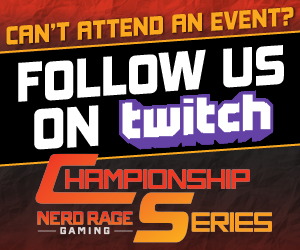Jacob Brown: Top 10 Standard Cards (#5-#1)
On Monday, I covered #10-#6 of the best cards in Standard. Today, we’ll cover the Top 5. Let’s get to it!
5. Fatal Push (Total Points: 20)
Power: 9
The tempo advantage provided by trading a one mana removal spell for a creature costing up to four mana is insane. Fatal Push makes it easy for a player to cast two spells in one turn, which usually puts you ahead. The only drawback to Push is the need to trigger revolt, but decks playing Push are usually able to trigger it, whether it be sacrificing an Evolving Wilds or attacking with a Thopter.
Meta: 5
Push is usually either the best card in your deck or the worst depending on the matchup. Against Mono-Red it’s a good tool for fighting the early onslaught of creatures. On the other end of the spectrum, Push is a totally dead card against Torrential Gearhulk or Scarab God decks. It’s really a coin flip on whether the card is great or awful, earning it a mediocre score in the metagame.
Role: 6
Here again, Push is either the best or the worst at what it does. Some decks rely heavily on Fatal Push to clean up creatures, while others pack Harnessed Lightning or Abrade and don’t really need the one mana removal spell. Yes, a one mana removal spell is going to be pretty good in most decks, but the removal suite in Standard is so great that Push is usually interchangeable with other removal spells.
4. Approach of the Second Sun (Total Points: 23)
Power: 8
This one isn’t too hard. While the card costs 7 mana and needs to be cast twice, it’s still a card that literally says “You win the game” on it. Not only does Approach of the Second Sun win the game, but the first cast gains 7 life, allowing you to survive to cast it a second time.
Meta: 5
Decks without the potential to close games quickly are a tough sell in Standard right now. Against aggressive decks, Approach is clunky and you’re left staring at it in your hand as Hazoret kills you on turn 5. Against Control decks the Approach player is left staring at a hand of sweepers and Approaches that will inevitably be countered as the opposing control player accumulates advantage. Post-board, control matchups do get more manageable, as Approach decks get to side out removal and bring in counter magic, but the deck full of counter and draw spells usually gets there against decks running Approach. However, Approach decks are very well positioned against midrange decks. A combination of sweepers and individual removal can usually clear the board and give Approach plenty of time to be cast. Post-board the games become more complicated, as cards like Duress and Negate come in, but a well-built Approach sideboard can fight these cards with counterspells and threats to back up the Approaches.
Role: 10
The namesake card of a deck is usually the most important card in it by a long shot. In game one, Approach is typically the only way to win and post-board it’s still usually the easiest and most common way to win. Approach is as important to the decks it’s played in as sauce is in pizza.
3. Hazoret the Fervent (Total Points: 24)
Power: 7
Hazoret the Fervent is a powerful card. Not only is she capable of providing a clock as a 5/4 indestructible with haste, she can also Shock the opponent to close out the game. The only thing holding Hazoret back is that she requires you to have no more than one card in hand to attack or block, making her susceptible to sitting for a turn or two while her controller figures out how to dump their hand. However, most of the time she is able to attack, and her discard ability enables her to attack, so the potential lack in speed doesn’t hold her back too much.
Meta: 7
Hazoret is similar to The Scarab God in that the card is insanely powerful but isn’t dominant because of all the hate for it. Cards like Ixalan’s Binding and Vraska’s Contempt are commonplace in Standard, making it unlikely that Hazoret will get to stay on the board for more than a turn. Even so, in a meta that appears to be slowing down, Hazoret is the best way to stay aggressive.
Role: 10
Hazoret is the most important card in any aggressive red deck in Standard. She hits hard and fast which is exactly what red decks want to do. Not only that, she provides the deck resiliency in the long game and her activated ability gives red decks an inevitability.
2. The Scarab God (Total Points: 24)
Power: 10
The Scarab God is the most powerful card in Standard. To begin with, it’s a 5/5 that doesn’t die. On top of that, it has two relevant abilities. The activated ability accumulates card advantage and puts pressure on the opponent through accumulating bodies, and the triggered ability puts you ahead by smoothing out your draws and pressuring your opponent.
Power: 6
The Scarab God cannot go lower than 6 in the current meta, but people are doing everything they can to fight him. Every deck in the format has one of two ways to beat the Scarab God: pressure or exile. Decks such as Mono-Red and BW Vampires don’t care much about The Scarab God, as by the time he would take over those decks have usually killed you already. Other, slower decks choose to fight the powerful creature with exile effects. Cards like Vraska’s Contempt, Ixalan’s Binding and Cast Out are seeing lots of play in Standard. Between the exile effects and aggro decks, The Scarab God doesn’t look too great, but is still the best finisher in the format.
Role: 8
The Scarab God isn’t really crucial to any decks, it’s just the best at what it does: ending the game. Take Grixis Energy for example, a deck I’ve touched on before. Grixis can win the game in a multitude of ways, such as Chandra, Torch of Defiance, Torrential Gearhulk, or Glint-Sleeve Siphoner. However, The Scarab God accumulates advantage so rapidly and closes out games so quickly that it’s every UB deck’s primary win condition.
1. Vraska’s Contempt (Total Points: 25)
Power: 6
On the surface, Vraska’s Contempt has a mediocre power level. The effect is versatile, and gaining two life is a huge upside, but four mana is a lot. Contempt is great for what it does, but I don’t think I can call any targeted removal spell that costs 4 powerful. Trading one for one on cards for such an expensive rate is simply too much to be elite, especially since it will usually be trading down on mana.
Meta: 10
While Vraska’s Contempt may not be the most powerful removal spell in Standard, it’s the best against the field. The best threats in in the format require Contempt to be taken off the board. Hazoret, Rekindling Phoenix, Chandra and The Scarab God are all cards found in tier one Standard decks that demand an answer like Vraska’s Contempt. Not only is the exile relevant, the two life is also great. Against any aggressive or midrange deck the two life from Contempt may be able to buy an extra turn or two and can be the difference between a win and a loss. Even in the matchups where Contempt shouldn’t be that great, such as UW Approach, it usually hits a sideboarded planeswalker or Torrential Gearhulk, helping you win the long game.
Role: 9
If it weren’t the for growing prevalence of the BW Approach deck, I think Vraska’s Contempt could easily be a 10 here as well. The BW deck is the only deck pairing Contempt with Ixalan’s Binding and Cast Out. Other than that, just about every black deck in the format leans on Contempt as its way to deal with the troublesome threats. As far as specific decks, I really like Contempt in Scarab God decks. Casting Contempt on the opponent’s end step and then untapping and slamming Scarab God is devastating. Not only does Contempt pair well with the Scarab God, but cards like Verdurous Gearhulk, Glorybringer, and Chandra can quickly close the game after your opponent loses their best threat.
Standard looks to be the best it has been in ages. The 10 cards I listed are great, but none are dominant or oppressive. The power level and diversity of the format is great and if Wizards can keep producing cards like these Standard should be good for a while.
Jacob Brown‘s Magic accomplishments include coming in second at the 2016 TCGPlayer States, winning a PPTQ, and winning infinite casual drafts. Contact him at nufan7@comcast.net.



